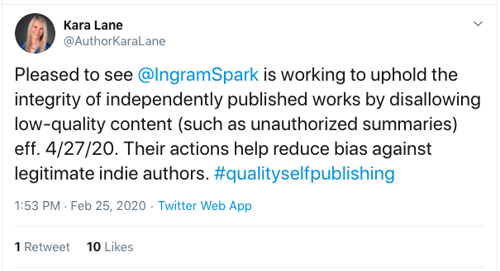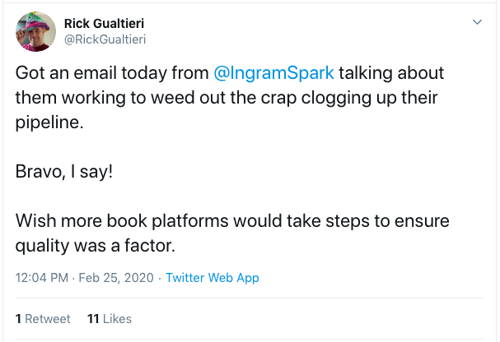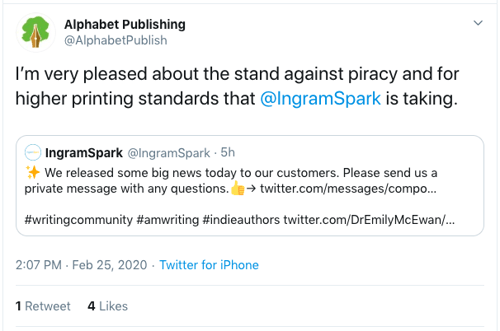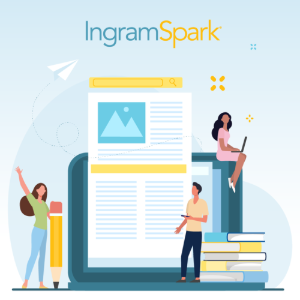IngramSpark takes a necessary stand to uphold the integrity of and reduce bias against independently published works. To align with our industry’s needs for content integrity, we will actively remove content from our catalog that is deemed unsuitable according to the criteria specified below, that may be deemed illegal or harmful under applicable law, or that may otherwise harm buyers or the reputations of IngramSpark, its affiliates, our publishers or distribution channels; IngramSpark retains the right to make any such determination in its sole and absolute discretion.
We take violations of law and the proprietary rights of others very seriously. You must ensure that your content does not violate any applicable laws or infringe upon the rights of others, including but not limited to copyright, trademark, privacy, or publicity rights.
The below criteria describe the types of content that may not be accepted:
IngramSpark's Catalog Integrity Guidelines
- Summaries, workbooks, abbreviations or similar type content without permission from the original author.
- Content containing material amounts of blank pages like notepads, scratchpads, journals, or similar type content.
- Content that mirrors/mimics popular titles, including without limiting, similar covers, cover design, title, author names, or similar type content.
- Content that is misleading or likely to cause confusion by the buyer, including without limiting, inaccurate descriptions and cover art.
- Content listed at prices not reflective of the book’s literary value.
- Content scanned from original versions where all or parts contain illegible content to the detriment of the buyer.
- Content created using automated means, including but not limited to content generated using artificial intelligence or mass-produced processes.
- Content that is duplicated across titles in the same format in multiple trim sizes.
- Public domain content may be free to use by anyone or may be licensed for use by more than one party. We will not accept content that is freely available on the web unless you are the copyright owner of that content. We do accept public domain content but may choose not to sell a public domain book if its content is undifferentiated or barely differentiated from one or more other books.
How To Protect Your Titles
We've curated the above guidelines to better set you and your book up for success. While going through each one, there are a few key points to keep in mind.
Are You Using Your ISBNs Correctly?
As a global distributor, IngramSpark does business in countries all over the world, each with its own set of rules and regulations. An excellent example of that would be ISBN usage. Like a fingerprint, a unique ISBN belongs to one title and one title only.
We encourage authors to purchase through their country's ISBN agencies to reduce risks. Each country has a single designated agency committed to providing ISBNs to authors and publishers. For that reason, you should acquire an ISBN from your country's approved ISBN agency. For example:
- Bowker is the official ISBN agency for the US
- Nielsen is the official ISBN agency for the UK and Ireland
- Thorpe-Bowker is the official ISBN agency for Australia
Is your Book Description Clear and Concise?
Besides the cover, your book's description is a window into the content you've created. It gives readers, retailers, and bookstores a glimpse of what they can expect from your title, so be as accurate as possible when writing it. It's best to avoid inaccurate data such as the wrong author name, vague product descriptions, or unoriginal content.
Are You Publishing Original Content?
Good content is the backbone of publishing success. Whether it's a book on self-help, a fiction novel, cookbook, or children's book, the content should be original and authentic. Things to avoid would be summaries of other literary works, large amounts of blank pages, or content that confuses the reader by mimicking another book's title, design, author name, and description.
![]()
Going over those few questions is a great start to making sure your book is not grouped with other deceitful titles. It also gives your book a better chance of being discovered for the right reasons while simultaneously reducing the bias against self-published content within the book industry. We take this very seriously and have dedicated ourselves to ensuring your titles garner the respect they deserve by weeding out books that break guidelines. Content determined to not meet our standards to uphold catalog integrity will be removed from the catalog. If we remove your title, and you believe your book does not meet one of the above flagged criteria, we’ll be glad to review your concern.
Most IngramSpark authors and publishers won’t be impeached by our catalog integrity guidelines.
For the most part, IngramSpark's catalog integrity guidelines have had a very positive response:
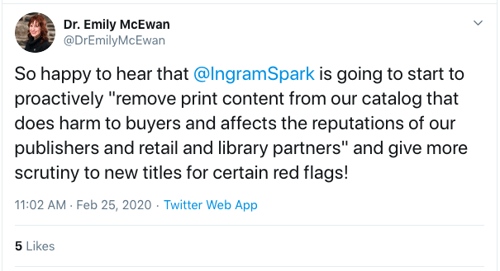
As one of the world’s largest book distribution services, Ingram maintains a digital catalog of millions of books that are made available to thousands of bookstore and library partners around the world. To maintain the high level of catalog integrity and reputation that we hold within the book industry, it’s important that our bookstore and library partners are purchasing content that is accurately represented. Our guidelines are made to ensure that they are.
If you have more questions, please be sure to review our helpful FAQ.


